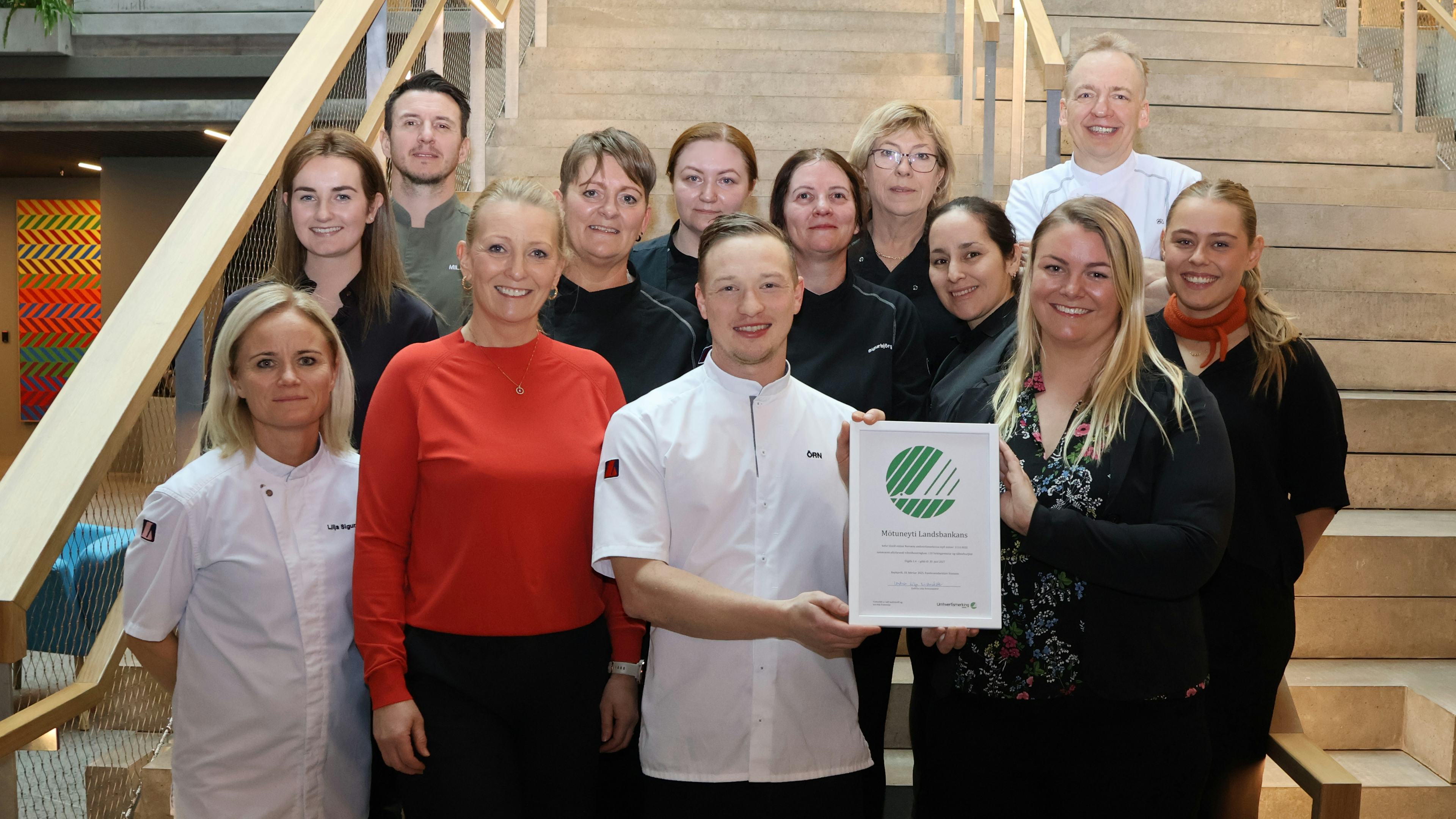Cookies
By clicking "Allow All", you agree to the use of cookies to enhance website functionality, analyse website usage and assist with marketing.
More on cookiesClear goals are key to sustainable development
In 2025, we continued to work systematically toward our sustainability goals. We hosted our fourth Sustainability Forum, conducted the first assessment of our impact on biodiversity, estimated greenhouse gas emissions from lending for the fifth time, renewed the Nordic Swan Ecolabel certification for the canteen in our new headquarters, and participated in the UN Business and Human Rights Accelerator.

Emphasis on transparent disclosure
Preparation of Landsbankinn’s 2025 sustainability accounts was based on the simplified draft of the EU’s sustainability reporting standards (ESRS), which were published in November 2025.
The Bank’s sustainability accounts cover the Group on the same basis as the Bank’s annual financial statements. The climate accounts include the operations of the subsidiary Landsbréf in terms of office space and vehicles, employee commutes and business travel. HR figures apply to Landsbankinn’s employees only. Landsbréf publishes its own sustainability information alongside its annual financial statement.
In 2025, Landsbankinn acquired a new subsidiary, insurance company TM tryggingar hf. TM’s sustainability report is published in a dedicated section of Landsbankinn’s sustainability report and covers the period from 28 February to 31 December 2025, which is the period during which TM has been part of the Landsbankinn Group. It can be assumed that TM will be included in Landsbankinn’s group-level climate accounting in the future, much as Landsbréf.

Sustainability accounts
The landscape of sustainability reporting is constantly evolving, and Landsbankinn places emphasis on responding quickly and reliably to ensure both compliance with laws and regulations and to promote security and transparency.
Landsbankinn continues to support the UN Global Compact and adheres to its principles. We also submit a Communication of Progress report to the UN Global Compact through their web portal.
The sustainability accounts function as a Communication of Progress report to PRB.
Initial disclosure of impact on biodiversity
Landsbankinn has worked diligently to understand the actual greenhouse gas emissions from its operations, both direct and indirect. Such emissions and their consequences have been a key focus of the Bank’s sustainability efforts from the outset. Biodiversity and climate change are closely linked and achieving climate goals requires halting the decline in biodiversity.
One key difference between the two issues is that greenhouse gas emissions impact the entire planet, regardless of where they originate, whereas biodiversity decline is often localised.
In 2022, Landsbankinn began work to deepen its understanding of the impacts of its operations on biodiversity. This was the logical next step following the understanding gained about the Bank’s climate impact. Landsbankinn joined the Partnership for Biodiversity Accounting Financials (PBAF) in 2022 and committed to assessing the impacts of its operations on nature and biodiversity in accordance with the recommendations of the Taskforce on Nature-related Financial Disclosures (TNFD) in 2024. By the end of 2025, it had become clear that PBAF would merge with the Finance for Biodiversity Foundation (FfB) as of January 2026. During preparation of the first TNFD report it had become evident that the Bank primarily relied on the TNFD methodology rather than PBAF guidance. For this reason, the Bank withdrew from PBAF and will henceforth place emphasis on following the TNFD recommendations.
Landsbankinn is now publishing, for the first time, a report on the impacts of its operations on nature and biodiversity in accordance with the TNFD recommendations, covering the year 2025. More about the TNFD report in the Bank’s sustainability accounts.

Biodiversity – Policy and Targets to 2030
“Biological diversity or biodiversity is a concept that reflects the living world in all its diversity. The diversity of life is the foundation of all ecosystems and the basis for their healthy functioning, and thus for all life on Earth. All living organisms, including humans, depend on the contributions of ecosystems, such as food, medicine, habitats, soil, oxygen and clean water; in short, everything that makes life possible.”
Successful Sustainability Forum
Landsbankinn hosted its fourth Sustainability Forum on 4 September. The event was well attended. Topics included climate issues, electricity, plastic production, the fashion industry, timber and delicious plant-based food. The keynote speakers were five company executives along with the Chair of the Climate Council.
Lilja Björk Einarsdóttir, CEO of Landsbankinn, opened the event and spoke, among other things, about the Bank’s role in sustainability, emphasising in particular the importance of fostering dialogue and increasing knowledge about sustainability. Sharing knowledge is a key component of the Bank’s sustainability work and part of fulfilling our commitments to the Science Based Targets initiative (SBTi), which the Bank has adopted under its sustainability policy.
Renewed Nordic Swan Ecolabel certification
In February, Landsbankinn’s canteen at Reykjastræti 6 received renewed Nordic Swan Ecolabel certification. This marked the first time the canteen has been certified since the Bank moved to its new buildings. The Bank’s canteen has been Nordic Swan ecolabelled since 2013 and was the first canteen in Icelandic to receive such certification.
The Nordic Swan certification is part of efforts to minimise waste and environmental impact in line with the Bank’s Sustainability Policy. The certification covers employee training, action to reduce waste, increase energy efficiency, reduce chemical content and use of harmful substances. It includes review of the ratio of organic products, which the employees of the canteen and the Bank’s sustainability team have recently worked to increase through improved business relations with suppliers. Food waste is closely monitored and various measures implemented to reduce it.
The Nordic Swan Ecolabel is the official ecolabel of the Nordic countries. The main object of the Nordic Swan is to reduce the environmental impact of products and services, and to help consumers make ecofriendly choices.

New dashboard for food waste
Following renewal of the canteen’s Nordic Swan Ecolabel certification, a dashboard was created, allowing food waste to be monitored per person, by type of meal and by day. Measuring food waste brings significant benefits, as it enables the identification of patterns and supports decision-making that maximises the use of ingredients and minimises food waste.
Landsbankinn’s canteen also services the Ministry for Foreign Affairs and the Ministry of Education.
Human rights accelerator
Participation in the UN Global Compact’s Business and Human Rights Accelerator in 2025 was an ideal opportunity to learn how the Bank can formally identify and address key human rights risks within its own operations and value chain.
It was highly beneficial for the Bank to gain access to data and methodologies that guide us step by step through the identification and prioritisation of human rights risks, engagement with stakeholders and how best to develop an action plan to maximise effectiveness in reducing both the likelihood and impact of potential human rights violations.
There is a certain risk that we take human rights for granted in Iceland. Landsbankinn’s long-term sustainability goals focus primarily on managing our impacts where they are greatest. To date, our focus has been on financed emissions, which are tangible and close at hand, but there is also broader impact on society to be considered. Addressing human rights issues effectively is a key part of sustainability, taking into account different groups at various stages of the value chain. This accelerator provides a framework do that and supports Landsbankinn's continued role as a trusted bank for a successful future.
Sustainability at new subsidiary - TM
In 2025, Landsbankinn acquired a new subsidiary, insurance company TM. TM’s sustainability report is published in a dedicated section of Landsbankinn’s sustainability report and covers the period from 28 February to 31 December 2025, which is the period during which TM has been part of the Landsbankinn Group. It can be assumed that TM will be included in Landsbankinn’s group-level climate accounting in the future, much as Landsbréf.
TM became a member of Principles for Sustainable Insurance (PSI) in early 2023. PSI is partnership of the UN and insurance companies focused on the management of ESG factors and arising opportunities. The initial PSI report on implementation of PSI indicators was published in 2025.
At year-end 2025, TM became a member of the UN Global Compact. The membership marks an important step in TM’s ongoing efforts toward responsible and sustainable operations. Through this membership, TM follows in the footsteps of its parent company, Landsbankinn, which has been a member since 2006.

Support extended to Katla Carbon
During the year, Landsbankinn extended its support to the Katla Carbon project (formerly SoGreen) through a new five-year agreement. The Bank purchases pre-produced carbon credits to support the education of girls in Africa. Katla Carbon supports the Bank’s sustainability goals, which are based on Sustainable Development Goal No. 5, on gender equality, and No.13, on climate action. This is expected to prevent 21,896 tonnes of emissions over the coming years.
Science-based climate targets
Landsbankinn’s goals to reduce greenhouse gas emissions were verified by the Science Based Targets initiative (SBTi) in February 2024.
Landsbankinn has undertaken to reduce emission under Scopes 1 and 2 by 95% before 2030 compared with 2019, the Bank’s reference year for the purpose of these goals. Landsbankinn has also obliged itself to continue to purchase renewable energy until 2030. The Bank’s main impact is through financed indirect emissions under Scope 3. Our financed emissions fall under five categories and the SBTi addresses this division in its review of the goals and the verification process. At year-end 2025, total Scope 3 emissions were 27% lower than in 2019.
In 2026, we intend to begin working on updating the Bank’s SBTi goal and align it with the new Financial Institutions Net-Zero Standard published by SBTi in July 2025.
Clear framework for sustainable finance
In early 2024, Landsbankinn published its updated Sustainable Finance Framework with a second-party opinion from Sustainalytics. Landsbankinn finalised the sale of green bonds in the amount of EUR 600 million in two issuances under the Framework, bringing total green issuances in EUR to seven, four thereof under the updated Framework.
Sustainable finance frameworks clearly define how funds raised through bond issuances or deposits will be allocated in a transparent and accountable manner.
The Framework is based on ICMA’s guidelines and the EU’s Taxonomy for green and social financing and the criteria for sustainable projects.
Landsbankinn’s Sustainable Finance Framework reflects the principles the market has agreed upon as an effective definition of projects that promote sustainability and the structure industries should adhere to in this regard. In most cases, the aim is to move the economy toward the goals of the Paris Agreement. To achieve this target, attention is paid to corporate energy use, transitioning from fossil fuels to renewable energy sources, building infrastructure for renewable energy, and more.

Transparency in the allocation of eligible funds
Landsbankinn publishes an annual allocation and impact report which details the projects financed by green bond issuances. The Bank’s Risk & Finance Committee operates a subgroup responsible for determining which funds qualify under the Framework and how they should be allocated across categories. Each year, the subgroup submits a proposal for the allocation of funds tied to outstanding green bonds to the Risk & Finance Committee. Once the allocation proposal is approved, a report is published on the Bank’s external website to inform investors.
Landsbankinn published an allocation and impact report on outstanding issuances and financed projects in March 2025. The report is issued with third-party verification.
Landsbankinn’s Sustainable Finance Framework outlines the specific requirements each project category must meet to qualify under the Framework. There are seven categories for green or blue projects and three categories for social projects.
Lending to eligible projects under the Framework amounted to a total of ISK 276 million at the end of 2025. The Bank worked towards the goal of increasing the ratio of responsible lending under the definitions of the Sustainable Finance Framework by 10% or ISK 25 billion and the goal was achieved in 2025.
Eignadreifing and Vaxtareikningur sjálfbær
We continue to offer sustainable investment methods, on the one hand with Eignadreifing sjálfbær, sustainable asset allocation fund, managed by Landsbréf and on the other with Vaxtareikningur sjálfbær, sustainable savings account. Eignadreifing sjálfbær was launched in 2021 as a specialised fund for retail investors. The fund integrates ESG factors into its investment decisions and is classified as an Article 8 fund under the SFDR regulation, meaning it actively promotes sustainability through its investments. At all times, at least 80% of the fund’s assets are allocated to sustainable investments. Vaxtareikningur sjálfbær, also introduced in 2021, allocates deposits to the financing of projects that contribute to sustainable development. Our customers can use these investment channels to let their savings positively impact the environment and community while achieving good returns.
Green vehicle loans
Landsbankinn supports the energy transition. Electric cars are an important aspect of the transition as their emission factor is lower and their operation more efficient, especially in Iceland.
We offer a 50% discount on the borrowing charge on electric cars and offer a 0.6 percentage point discount on their financing.